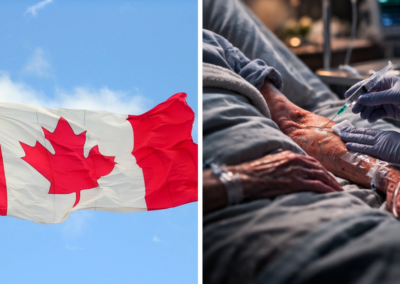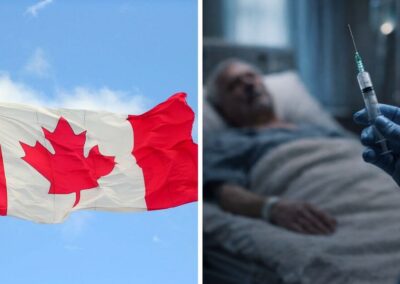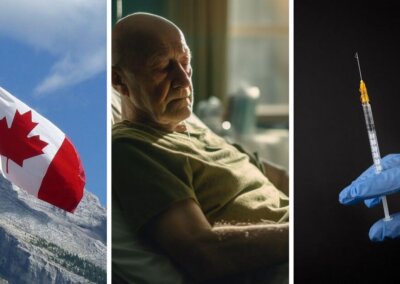Seven out of ten palliative care doctors surveyed believe the British Medical Association (BMA) should remain opposed to assisted suicide, a new survey has revealed.
The largest poll to date of British medics’ views also showed that only 30% of doctors surveyed supported the BMA actively supporting attempts to change the law to allow euthanasia. Whereas 63% of doctors opposed the BMA supporting a law change or be neutral on the matter, with 40% expressing the view that the BMA should stay with it’s current position opposing a law change and 23% holding the position that is should be neutral on the matter.
When asked whether the BMA support a change in law which would permit physician-assisted suicide, 40% of doctors said it should actively support a law change, 33% said it should stick with its present policy of opposing a law change, and 21% backed a neutral stance.
However, 70% of palliative care doctors opposed a change in the medical bodies stance, whilst just 7% were in favour.
Some 44% of geriatricians were opposed to the BMA changing their stance on assisted suicide, whilst only 27% were in favour.
General Practitioners, too, seem less keen on seeing a change in the law, a result echoing the findings of their own Royal College earlier this year.
In comparison, calls for changing the BMA’s stance on assisted suicide came largely from doctors who rarely deal face-to-face with patients, such as histopathologists.
Support was also bolstered by those who have never practised medicine because they are students or do not hold a license to practice, and retired doctors.
Conscientious objection could become an issue
If the law regarding assisted suicide were to change in the future, the right to conscientiously object and opt-out of administering life-ending drugs could become an issue.
Despite doctors narrowly being in favour of a change of law, 54% of doctors revealed in the poll that they would not be willing to participate actively in the process of administering life-ending drugs. Only 26% said they would be willing, and 20% were undecided.
So, while there appears to be an appetite for allowing patients to end lives, it seems there is much less enthusiasm for providing such assistance. In Canada, the Superior Court of Justice Division Court of Ontario ruled in 2018 that if doctors are unwilling to perform legal actions, such as assisted suicide, they should find another job.
What happens next
Currently, the BMA believes that “the ongoing improvement in palliative care allows patients to die with dignity … [and] insists that physician-assisted suicide … voluntary euthanasia … [and] non-voluntary euthanasia should not be made legal in the UK.”
The doctors’ union has had a policy opposing assisted suicide since the 1950s, but very briefly became neutral on the issue in 2005.
Since then, the BMA has been opposed to all forms of assisted suicide – a position they reaffirmed in 2016 at the organisation’s annual representative meeting.
While the BMA emphasised that the poll was not a vote and did not commit them to any change in its formal opposition to assisted suicide, it is possible doctors will call for a formal change in the medical bodies stance on assisted suicide during its next annual meeting due to take place next summer.
The results had been due for release and debate this summer, but the BMA’s annual meeting was postponed because of the coronavirus pandemic.
Duty of care
Earlier this year, as the BMA was collecting responses on its survey, a large group of prominent palliative care doctors called on the BMA to uphold their duty of care and remain opposed to assisted suicide.
In a letter published in The Times, over fifty palliative care doctors and healthcare professionals said the existing law, which prohibits any form of assisted suicide or euthanasia, “ensures that doctors continue to uphold their duty of care, avoiding the inherent risks to sick and vulnerable patients that physician assisted suicide would bring”.
The doctors also used the letter to highlight how safeguards are ignored and eligibility criteria is soon expanded in countries that allow assisted suicide. Referencing Canada, the doctors say:
“Canada’s Federal government has consulted on expanding assisted dying laws to the mentally ill, to ‘mature minors’ and individuals whose deaths are not imminent. Meanwhile Canadian hospices are facing pressure to provide assisted death or risk losing their funding.”
‘Mendacious claims’
Commenting on the poll, Dr Gordon Macdonald, Chief Executive of Care Not Killing said:
“We welcome the fact that many active medics have repeatedly rejected the mendacious claims made by those pushing for this change, namely that legalising assisted suicide and euthanasia can be done with safeguards and would not put pressure, real or perceived, on vulnerable people to end their lives prematurely.
“They have seen what happens in the small number of jurisdictions that have gone down this dangerous path – places like Oregon and Washington. These two US states are held up as the model to copy, but in both, a majority of those opting to end their lives cite fear of being a burden as among their key reasons, and others talk about financial concerns. While the list of conditions that qualify for the lethal cocktail of barbiturates continues to grow, some experts have warned that allowing assisted dying might also be normalising suicide in the general population. Suicide rates are, after all, a third higher in Oregon than the US average.
“In Canada, last year a Court struck down the requirement that a person be terminally ill before they qualify for euthanasia. This followed the case of Alan Nichols, a former school caretaker who was physically healthy, but struggled with depression. His life was ended by lethal injection in July. Roger Foley, meanwhile, was repeatedly offered the drugs to kill himself, while being denied the social care to live a dignified life, due to the cost.
“Closer to home, we see how laws introduced in the Netherlands or Belgium, which were supposed to be limited to mentally competent terminally ill adults, have been extended to non-mentally competent adults and children, profoundly disabled people, and even those with treatable psychiatric problems such as depression and anorexia.”
Current laws protect
Dr Macdonald concluded: “The current laws on assisted suicide and euthanasia exist to protect those who are sick, elderly, depressed or disabled from feeling obliged to end their lives. They protect those who have no voice against exploitation and coercion and those who care for them who might come under pressure to conserve scarce resources. They do not need changing.”












